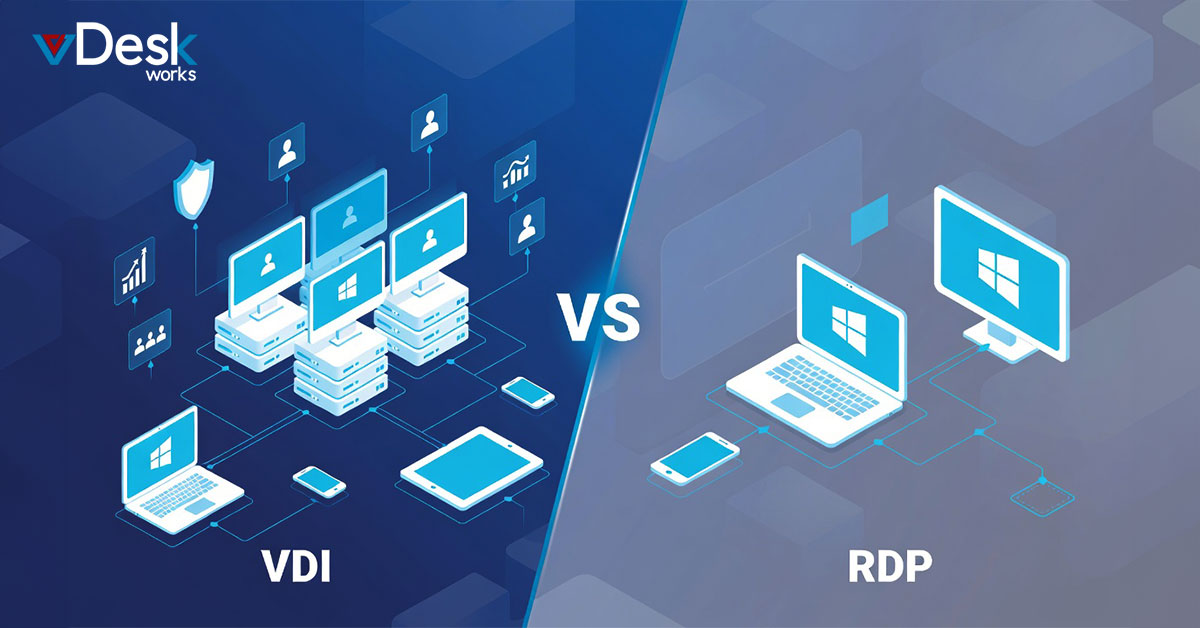In the business world, companies need to find ways to adapt to the ever-changing landscape. During the pandemic, businesses worldwide shifted to remote work. Even as pandemic restrictions have eased, many companies have continued to work from home. This shift has caused more companies to start using cloud-hosted virtual desktops. The following blog post will explain what cloud-hosted virtual desktops are, who can use cloud-hosted virtual desktops, and why companies should be using them.
Cloud-Hosted Virtual Desktops Defined
Cloud-hosted virtual desktops are an approach to computing where the server is accessed through the cloud via a secure gateway. This process can be done on any device with an internet connection. The user’s data and files are stored on the cloud server instead of the device itself. In contrast, on-premise systems store the data on the actual device. Cloud-hosted virtual desktops are more beneficial than on-premise solutions in the long run. Examples of cloud-hosted virtual desktops include vDesk.works, VMware Cloud Horizon, Citrix, and Amazon Web Services.
Who Can Use Cloud-Hosted Virtual Desktops?
Companies of all sizes and industries can benefit from using cloud-hosted virtual desktops. Some examples of industries that can use cloud-hosted virtual desktops include legal services, healthcare, education, construction, manufacturing, marketing, and financial services. Other types of companies, such as call centers and startups, can also benefit from using cloud-hosted virtual desktops to conduct operations more smoothly. Cloud-hosted virtual desktops can also be used in scenarios such as business process outsourcing and business development.
Benefits of Using Cloud-Hosted Virtual Desktops
There are several significant benefits that businesses can gain from using cloud-hosted virtual desktops. These benefits include increased flexibility, reduced costs, increased technical support, enhanced security, increased productivity, and increased scalability. Let’s go over these benefits in more detail below.
1. Increased Flexibility
One of the main reasons that companies should use cloud-hosted virtual desktops is that they offer increased flexibility. Many virtual desktop providers can be accessed on systems such as PC, Mac, Linux, iOS, or Android. Users can switch between working on their computer, tablet, or smartphone. Virtual desktops can also be used on thin clients. The virtual desktops can also be accessed on any HTML-5 browser. Also, many virtual desktop providers have cross-device compatibility. Therefore, users can turn any device into a Windows virtual desktop.
2. Reduced Costs
Another benefit of using cloud-hosted virtual desktops is that they can help reduce company costs. Since cloud desktops can be used on any device, companies can enforce bring-your-own-device policies and not have to spend funds on supplying devices to new employees. Users can also revitalize their older, outdated devices by connecting them to the server. Cloud-hosted virtual desktops can also help companies save money since many providers will automatically update software for users. Also, the company won’t have to maintain hardware since data is stored on the remote cloud server. Many cloud-hosted virtual desktops will come pre-packaged with third-party tools like Windows and Office 365. Virtual desktop providers also offer 24/7 remote support, so companies won’t have to invest as much in an in-house IT support team.
3. Increased Technical Support
As mentioned above, many cloud-based virtual desktop providers offer clients 24/7 technical support. Therefore, there won’t be any issues or decreases in productivity if users run into technical difficulties while working. One way that virtual desktop providers can provide technical support is through remote assistance. In remote assistance, the support agent will take control of the user’s device with the user’s permission. The support agent will then resolve the issue while working from their own location. Remote assistance, or session shadowing, allows for the technical support team to quickly and easily resolve a user’s issue.
4. Enhanced Security
Another benefit that companies can gain from using cloud-hosted virtual desktops is that they provide enhanced security. In on-premise solutions, data is more likely to get affected by cyberattacks or events like power outages. However, with virtual desktop solutions, the data is safe and secure on the cloud server at all times due to disaster recovery solutions. Many virtual desktop providers also include security measures such as firewalls, frequent backups, and multi-factor authentication. If a user loses their device, management can remove the device’s access to the system, and the user can log back in using a new device.
5. Increased Productivity
Another benefit of using cloud-hosted virtual desktops is that they can lead to increased productivity. Managers can view the websites and apps employees visit most and how much time they spend on them through a centralized management console. The centralized management console also provides managers with reports on the server farm’s health and applications that are running on the server. These reports can be exported daily, weekly, or monthly. Users can easily work on projects with co-workers and clients that are located in different cities or countries. Virtual desktops can also increase productivity through productivity suites. These productivity suites can include features such as project management, employee management, unified communications, time tracking, screenshot tracking, and expense tracking.
6. Increased Scalability
Cloud-hosted virtual desktops also offer companies increased scalability. With this level of scalability, managers can add or remove users and devices as the company’s needs change. Managers can also add third-party software licenses and distribute them to the appropriate users. Managers can make these changes at any time through a centralized management console.
Cloud-hosted virtual desktops are useful tools for companies of all sizes and industries to use to make the shift to remote work easier. These virtual desktops are also beneficial for companies that have operations in different cities and countries. There are many benefits to using cloud-hosted virtual desktops. These benefits include increased flexibility, reduced costs, increased technical support, enhanced security, increased productivity, and increased scalability.
There are several significant virtual desktop providers currently on the market. These providers include vDesk.works, VMware Horizon Cloud, Citrix, and Amazon Web Services. If companies want to utilize the best and most efficient cloud-hosted virtual desktop, they should use vDesk.works. For more information on vDesk.works’ cloud-hosted virtual desktops, visit https://vdeskworks.com/ to speak to a product representative and receive a live demo.


 Noah Thompson
Noah Thompson
















